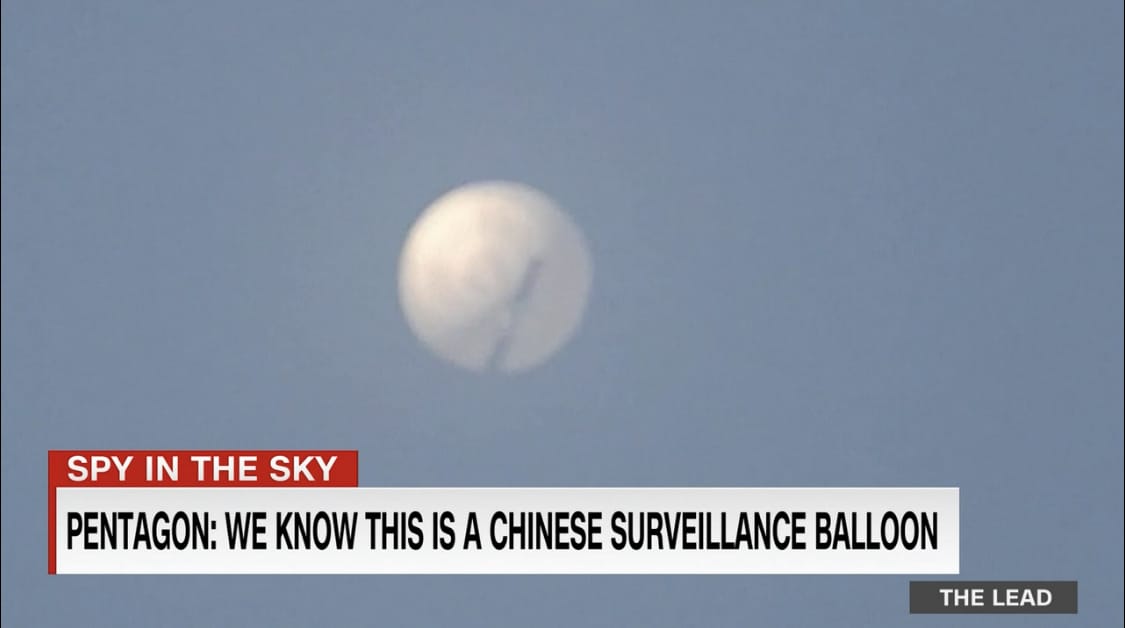For several decades the American public has been instilled with an intrinsic fear of and hatred for China.
No singular event in this seemingly inevitable march to war is more emblematic of the American public’s warped psyche than the “Chinese Spy Balloon” narrative—perhaps due, in part, to its facial absurdity. The happening eclipses even similarly nonsensical yarns such as widespread TikTok paranoia (see the NSA’s PRISM program), China’s American farmland purchases (Chinese firms account for approximately .5% of all foreign-owned farm and forest land in the U.S.), and the “invasion” of Chinese fentanyl through the Southern border (fentanyl trafficking is illegal in China).
Indeed, even the pervasive use of the phrase “Chinese Spy Balloon”—an utterly unsupported Pentagon accusation—is emblematic of the absolutely captured state of the American consciousness.
This narrative control is critical to Washington as it manufactures consent for its declared “great power competition” with Beijing.
The saga began on February 2, when an official spokesman announced the Pentagon was tracking the passage of a “high-altitude surveillance balloon” over the continental United States. The spokesman expressed confidence that the “surveillance balloon” belonged to the People’s Republic of China (PRC). In this initial announcement, it was importantly noted “[i]nstances of this kind of balloon activity have been observed previously over the past several years.”
On February 3, a PRC spokesperson confirmed the balloon originated from China, but said it was merely a civilian weather balloon on a research mission. The spokesperson apologized for the intrusion and explained the balloon entered the United States by accident due to unexpected wind currents. The statement stressed continued communication and diplomacy.
On the afternoon of February 4, American forces downed the balloon just off the coast of South Carolina. The next day, the Chinese foreign ministry called the response “a clear overreaction and a serious violation of international practice.”
In its press conference announcing the shootdown, a senior Pentagon official admitted that so-called “PRC government surveillance balloons transited the continental United States briefly at least three times during the prior administration and once that we know of at the beginning of this administration, but never for this duration of time.” Another official admitted that the Pentagon had tracked the balloon since it entered Alaskan airspace on January 28.
Although the Pentagon insists the balloon was a clandestine surveillance device, it has not tendered a shred of evidence to support that assertion.
It would make little sense for the PRC to launch surveillance balloons across the United States because, as stated during the Pentagon’s initial press briefing, “[the balloon] does not create significant value added over and above what the PRC is likely able to collect through things like satellites in Low Earth Orbit.”
As the balloon made its way from Montana to South Carolina, the American people were whipped into predictable histrionics, with most politicians calling for the balloon to be shot down.
Representative Nancy Pelosi (D-CA) stated on February 3, “[i]t wasn’t a good idea to have a spy balloon fly over our country, it must come down.”
Senator Mitt Romney (R-UT) called the balloon a “Potemkin village attempting to conceal [China’s] malign ambitions toward our country and the global order.” He urged the Pentagon to shoot down the balloon, and later quipped “[a] big Chinese balloon in the sky and millions of Chinese Tik Tok balloons on our phones. Let’s shut them all down.”
True to form, the general Republican messaging maligned Joe Biden’s perceived weakness for not shooting the balloon down faster.
Establishment Republican mainstays, Senators Ted Cruz (R-TX), and Marco Rubio (R-FL), and House Intelligence Committee chair, Representative Mike Turner, blasted the Biden administration’s inaction in separate TV interviews.
On February 4, Turner said on Meet the Press, “[t]his [balloon] should never have been allowed to enter the U.S., and it never should have been allowed to complete its mission,” adding “I think this administration lacks urgency.”
The same day Cruz told Face the Nation that Biden gave the PRC “a full week…to conduct spying operations over the U.S., over sensitive military installations,” and that “this entire episode telegraphed weakness.”
On February 5, Rubio betrayed the true intent of accusing Biden of weakness—to give cover for more extreme escalation. He told ABC “[t]hese guys [U.S. leadership] can’t even do anything about a balloon flying over U.S. airspace? How can you possibly count on them if something were to happen in the Indo-Pacific region? How are they gonna come to the aid of Taiwan?”
Rubio’s comments fly in the face of Washington’s long-standing Sino-American policy—that the U.S. acknowledges China’s dominion over Taiwan, but will not say what it would do if China were to use force to reconstitute the wayward island.
While some populist Republicans have bravely departed from the establishment’s support for Ukraine, many led the chorus of voices urging escalation—and not diplomacy.
Senator Josh Hawley (R-MO) issued multiple tweets regarding the balloon. On February 3, he stated “[n]ow #China is OPENLY spying on us and the Biden Admin does nothing. China is trolling us. They know Biden is weak.” He later added, inter alia, “SHOOT IT DOWN.”
Representative Matt Gaetz (R-FL) tweeted on February 3, “[t]he Department of Defense would like to know the Balloon’s pronouns,” a comment that detracts from Washington’s objectively aggressive global posture by suggesting ineptitude. On February 5, he wrote, “I wonder how much the [Chinese Communist Party]-funded Biden Center at UPenn studied Balloon Theory.”
On February 3, Representative Marjorie Taylor Greene issued a lengthy Twitter thread urging the Biden Administration to “SHOOT DOWN THE BALLOON!!” Taylor Greene further called the balloon’s presence “an act of aggression,” that she blamed on the Chinese Communist Party and Joe Biden’s inaction.
Surprisingly, the invective from populist Republicans surpassed even that of the ultra-hawkish architects of Washington’s fortress Taiwan policy, Senators Lindsey Graham (R-SC) and Bob Menendez (R-NJ).
For his part, Bob Menendez neither Tweeted, nor issued a press release about the balloon.
Graham’s statement was much more measured than that of his populist colleagues. February 4, he thanked the military and the Biden administration for shooting down the balloon, but then stated: “[t]he next step is to recover the attached surveillance equipment to determine if the Chinese were lying about the balloons [sic] true purpose…Our intelligence community doubts the Chinese explanation […] but we will only know the true answer when the platform is recovered.”
The universal rejection of diplomacy in favor of an immediate and violent response to the balloon is deeply troubling—from the public to neoliberal Democrats, to the populist right. Surely a collision between U.S. and Chinese vessels in the South China Sea or aircraft in the Taiwan Strait would provoke a similar response. Some popular pundits even called for extreme escalation, such as urging the Pentagon to scramble jets from Guam, ostensibly to attack or threaten mainland China.
The banner narrative favored by mainline Republicans and the populist Right alike—that Joe Biden is weak—is insidious, because it implies that Biden should be more aggressive. Furthermore, it excuses Biden’s objectively ultra-hawkish policy against China.
Just in the last few weeks, the Biden administration continued its redoubling of the Asia Pivot launched by Barack Obama and furthered by Donald Trump: the U.S. Marine Corps opened a new base in Guam as the U.S. opened an embassy in the Solomon Islands, furthered diplomatic measures meant to militarize Japan, announced the opening of new military installations in the Philippines and Palau, and furthered a deal that would secure it exclusive military access to Micronesia, an area of the Pacific Ocean as large as the continental U.S.—all with the express and stated aim of confronting China.
Furthermore, any discussion of Chinese surveillance of the United States must necessarily begin with our own surveillance of mainland China. In 2001, “[a] United States Navy spy plane on a routine surveillance mission near the Chinese coast collided with a Chinese fighter jet that was closely tailing it” causing the American plane to crash land in Chinese territory. These surveillance missions continue to this day, along with the at least monthly transit of American warships through the Taiwan Strait, a channel of water that separates Taiwan from mainland China by 110 miles at its widest point.
Meanwhile, the “Biden is weak” narrative enables the Biden administration’s ultra-hawkish policy by drawing attention away from it. While the nation’s imagination was captured by a white balloon, Secretary of State Antony Blinken canceled a rare diplomatic visit to China. That the Pentagon knew the balloon’s trajectory as soon as it entered Alaskan airspace suggests it may have been used as a convenient excuse to cancel the talks. This is further evidenced by the fact that similar balloons have entered the United States without public knowledge.
Furthermore, the timing of the balloon’s transit suggests it wasn’t purposely dispatched by China, as its incentive is likely to preserve Blinken’s visit. The long-planned trip would have seen Blinken meet with his Chinese counterpart and possibly with Chinese leader Xi Jinping. From the PRC perspective, such a visit is an opportunity to negotiate with a country that is encircling it militarily. A high-level meeting might have soothed its offense at yet another diplomatic envoy to Taiwan by an American House Speaker.
Unfortunately, the prevailing narrative won the day—while Americans’ heads were in the clouds, imagining a biowarfare attack, or falsely reporting the balloon carried explosives, Sino-American relations deteriorated even further. Distressingly, the American public exhibited its eagerness to rush to just about any conclusion concerning China.
That rush to judgment—and violent action—should concern us more than the specter of a wayward white spy balloon.
































